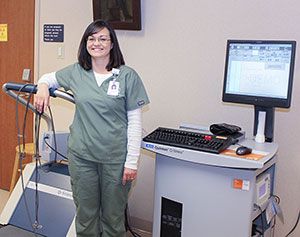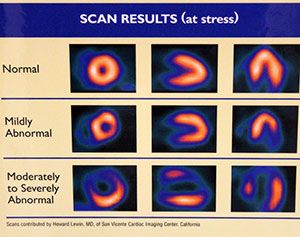Meet the BBGH Electrodiagnostic health care professional

Electrodiagnostic Department Coordinator Tara Watt, LPN, stands in the hospital’s stress test room next to a treadmill and monitor.
The Box Butte General Hospital Electrodiagnostic Department’s Coordinator is Tara Watt, LPN, who has been with BBGH for 15 years. She’s the one that runs the cardio stress tests that aren’t all that pleasant but vital in helping physicians diagnose cardiovascular problems that may be damaging the heart. “There’s a reason we call it stress test,” she said. “We want to get the patient’s heart rate up high to increase blood flow in the coronary arteries by having them walk as fast as they can on a treadmill while hooked up to an electrocardiogram. If they can’t physically do that or are on certain heart medications, we use a prescription medication called Lexiscan that works by dilating the coronary arteries, thus increasing blood flow to the heart.” Another medication used is Dobutamine, which raises the patient’s heartrate. “We don’t do those very frequently,” Ms. Watt said.

The above images from a nuclear medicine heart scan shows what a normal, mildly abnormal and moderate to several abnormal heart looks like.
After the patient gets done with increasing stress on their heart, by whatever means, their heart is scanned in the Nuclear Medicine department. “For this test, a safe, radioactive substance called a tracer is injected into your bloodstream through a vein,” Ms. Watt said. “The tracer travels to your heart and releases energy. Special cameras outside of your body detect the energy and use it to create pictures of your heart (see photo).” What the physician is looking for is how blood is flowing to the heart muscle to see if there are any blockages. If part of the heart muscle isn't receiving blood, it may be a sign of coronary heart disease (CHD). CHD can lead to chest pain called angina, a heart attack, and other heart problems. When a nuclear heart scan is done for this purpose, it's called myocardial perfusion scanning.
Ms. Watt said her department also conducts Ankle-Brachial Index (ABI) tests to measure blood pressure at the ankle and in the arm of a person. Blood pressure tests are done before and after exercising, to compare levels. If a slight drop in ABI is indicated, that means the patient may have Peripheral Arterial Disease (PAD), which can be linked to a higher risk of heart attack or stroke.
Another duty she performs is helping patients understand and use portable heart monitors a physician or non-physician practitioner may wish them to have in order to record heart rhythms while at home. “Holter and event monitors are small, portable devices,” Ms. Watt said. “You can wear one while you do your normal daily activities. This allows the monitor to record your heart for a longer time than an EKG. Some people have heart rhythm problems that occur only during certain activities, such as sleeping or physical exertion. Using a Holter or event monitor increases the chance of recording these problems. Although similar, Holter and event monitors aren't the same. A Holter monitor records your heart's electrical activity the entire time you're wearing it. An event monitor records your heart's electrical activity only at certain times while you're wearing it.”
Ms. Watt said the best part of their job is interacting with the patients. “I get a lot of different people, different ages and backgrounds.
She and her husband Jordan live in Alliance with their two sons.
Box Butte General Hospital is an equal opportunity provider and employer.


